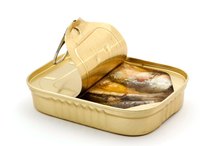What does fact checked mean?
At Healthfully, we strive to deliver objective content that is accurate and up-to-date. Our team periodically reviews articles in order to ensure content quality. The sources cited below consist of evidence from peer-reviewed journals, prominent medical organizations, academic associations, and government data.
- American Heart Association: Monounsaturated Fats
- MedlinePlus; Calcium in Diet; Linda Vorvick, M.D., et al.; March 2009
The information contained on this site is for informational purposes only, and should not be used as a substitute for the advice of a professional health care provider. Please check with the appropriate physician regarding health questions and concerns. Although we strive to deliver accurate and up-to-date information, no guarantee to that effect is made.
Are Canned Smoked Sardines Healthy?
Before tuna fish was a staple in American cupboards, canned sardines reigned on the shelves as an inexpensive source of protein. The popularity of sardines declined after World War II, along with a dramatic decrease in the fish population, according to an article in "The Washington Post." While the number of sardines has rebounded, they have not yet reclaimed their position as a culinary staple. If you want a healthy way to get more omega-3 fatty acids and calcium in your diet without spending a lot of money, sardines are a good choice.
Nutrition
Sardines are smoked before being packed in cans, usually with some type of oil. The nutritional content of smoked and canned sardines varies between manufacturers depending on the type of oil used and the amount of salt added as a preservative and for flavor. One can is considered a serving, and a typical serving of smoked sardines packed in olive oil contains around 14 grams of protein, 168 calories and 14.4 grams of fat. 2.4 grams of the fat content is saturated. Most of the fat content in sardines stems from polyunsaturated and monounsaturated fats, which may help to lower cholesterol levels and prevent heart disease 2.
- Sardines are smoked before being packed in cans, usually with some type of oil.
- One can is considered a serving, and a typical serving of smoked sardines packed in olive oil contains around 14 grams of protein, 168 calories and 14.4 grams of fat.
Omega-3 Fatty Acids
King Oscar Sardines Nutrition
Learn More
Omega-3 fatty acids are polyunsaturated fats that you can only get from food sources. Tufts University School of Medicine notes that omega-3 fatty acids may help prevent cancer and rheumatoid arthritis 3. Sardines contain two types of omega-3 fatty acids called EPA and DHA, which are particularly helpful in lowering your risk of developing heart disease. A 4-oz. serving of canned sardines contains 1.7 grams of omega-3 fatty acids.
- Omega-3 fatty acids are polyunsaturated fats that you can only get from food sources.
- serving of canned sardines contains 1.7 grams of omega-3 fatty acids.
Calcium
Calcium is a vital mineral for the formation and maintenance of bones and teeth and the prevention of osteoporosis. It also plays an important role in blood clotting and muscle contraction. If you are lactose-intolerant, it is particularly important to find other food sources high in calcium and eat them daily. Recommended daily intakes of calcium vary depending on age and gender, with teens and adults needing from 1,000 to 1,300 milligrams per day. Just 2 oz. of canned sardines holds 240 milligrams of calcium. The calcium in sardines mainly comes from the bones, which are soft and edible from the canning process.
- Calcium is a vital mineral for the formation and maintenance of bones and teeth and the prevention of osteoporosis.
- The calcium in sardines mainly comes from the bones, which are soft and edible from the canning process.
Sodium
Are Canned Sardines Healthy?
Learn More
Read the labels of canned, smoked sardines carefully. While they offer many health benefits, they are often high in sodium. Sodium levels vary significantly among producers. A can of sardines can contain anywhere from 160 milligrams of sodium to 340 milligrams. A healthy adult should get no more than 2,300 milligrams of sodium per day, but if you are dealing with kidney disease or high blood pressure, you should limit your intake to less than 1,500 milligrams per day.
- Read the labels of canned, smoked sardines carefully.
- While they offer many health benefits, they are often high in sodium.
Related Articles
References
- "The Washington Post"; A New School of Thought About Sardines; Jane Black; June 2009
- American Heart Association: Monounsaturated Fats
- Tufts University School of Medicine; Omega-3 Fatty Acids; March 2002
- MedlinePlus; Calcium in Diet; Linda Vorvick, M.D., et al.; March 2009
- Fish, sardine, Atlantic, canned in oil, drained solids with bone. FoodData Central. U.S. Department of Agriculture. Published April 1, 2019.
- Innes JK, Calder PC. Marine omega-3 (N-3) fatty acids for cardiovascular health: An update for 2020. Int J Mol Sci. 2020;21(4):1362. doi:10.3390/ijms21041362
- University of Rochester Medical Center. Health encyclopedia: nutrition facts, fish, sardine, Atlantic, canned in oil, drained solids with bone, 1 sardines.
- Morris MC, Brockman J, Schneider JA, et al. Association of seafood consumption, brain mercury level, and APOE ε4 status with brain neuropathology in older adults. JAMA. 2016;315(5):489-497. doi:10.1001/jama.2015.19451
- Derbyshire E. Brain health across the lifespan: A systematic review on the role of omega-3 fatty acid supplements. Nutrients. 2018;10(8):1094. doi:10.3390/nu10081094
- Ellis E. 4 keys to strength building and muscle mass. Academy of Nutrition and Dietetics. Updated January 20, 2020.
- Chaddha A, Eagle KA. Omega-3 fatty acids and heart health. Circulation. 2015;132(22):e350-352. doi:10.1161/CIRCULATIONAHA.114.015176
- Balfegó M, Canivell S, Hanzu FA, et al. Effects of sardine-enriched diet on metabolic control, inflammation and gut microbiota in drug-naïve patients with type 2 diabetes: A pilot randomized trial. Lipids Health Dis. 2016;15:78. doi:10.1186/s12944-016-0245-0
- Moores S. Pregnant safe sources of omega-3 fats. Academy of Nutrition and Dietetics. Updated November 7, 2019.
- National Institutes of Health, Office of Dietary Supplements. Calcium fact sheet for professionals. Updated February 14, 2020.
- American College of Allergy Asthma & Immunology. Fish allergy. Updated March 21, 2019.
- Environmental Defense Fund. Sardines.
- U.S.Food & Drug Administration. Selecting and serving fresh and frozen seafood safely. Updated March 28, 2019.
Resources
Writer Bio
Since 1997, Maria Christensen has written about business, history, food, culture and travel for diverse publications. She ran her own business writing employee handbooks and business process manuals for small businesses, authored a guidebook to Seattle, and works as an accountant for a software company. Christensen studied communications at the University of Washington and history at Armstrong Atlantic State University.









